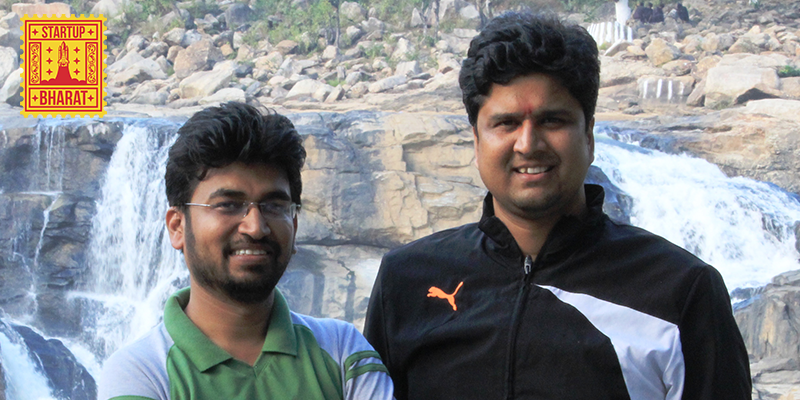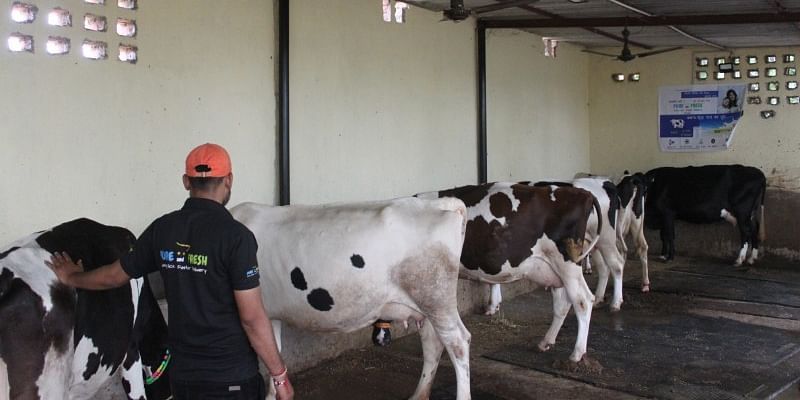Manish Piyush, an IIM graduate, who worked in 14 countries in senior positions, came back to his home state Jharkhand to solve a basic problem - access to chemical-free milk.
“People are craving to solve urban problems, but not many are solving some basic problems in India,” says Manish.
Manish joined hands with his childhood friend Aditya Kumar to start milk-subscription app Puresh Daily Foods in 2019. The Ranchi-based startup provides organic cow milk and chemical-free dairy products.
In the journey of starting the company, the co-founders left cushy jobs, learnt coding, sold software, and also became milkmen to understand the dairy business.

[LtoR] Adiya Kumar and Manish Piyush, co-founders of Puresh Daily
Within a year of its launch, Puresh is selling over 1,000 litres of milk every day, has over 1,500 customers, and is seeing profits. Since milk is an essential item, Puresh saw a 100 percent jump in its revenue in the last two-three months due to the coronavirus lockdown, says Manish.
The turning point
Manish and Aditya did their schooling in Ranchi, Jharkhand, and studied together at Birla Institute of Technology, Mesra (Ranchi). Later, they left their hometown to pursue higher studies.
After completing his engineering, Manish landed a job in a marketing role with the Tata Group in Jharkhand. While he worked for a couple of years, he then decided to do an MBA at IIM Indore, and flew aboard to take up a global role at the Tata Group. Manish says he worked in 14 countries from 2009 to 2017.
Manish returned to India in 2017 as the General Manager of Tata Motors in Mumbai. During this time, he learnt that his home state was organising an event called 'Momentum Jharkhand', about business possibilities in the State.
During the conference, a chai-sutta break with his friends became a turning point for Manish. He saw a few local tribals from Jharkhand and felt that conferences like these are just for two days, but Jharkhand stays the same as the best minds move out, just like him and his friends.
“The brain drain problem in India might have been solved, but not for states like Jharkhand,” he says. This prompted Manish to call his childhood friend Aditya to ask if he wanted to come back to his hometown and do something together. “With a fat salary and wife and kids, it was a tough call, but it did not take us long,” says Manish. Both resigned their respective jobs in 2017 to come back to Ranchi.
Startup hubs vs startup bharat
Many people suggested Manish and Aditya to go to Bengaluru or Gurugram to start up, but the duo was determined to be in Ranchi, because the aim was to improve business activity in the home state.
Interestingly, Manish and Aditya did not foray into the milk business at first. While they were still figuring out what to do, they knew technology would be core to any business, and so, in their 40s, they learnt coding. “Selling and developing software was a tool to understand different businesses,” says Manish.
Understanding the dairy market
However, Manish says, he never knew they would foray into a dairy business. “It all started with an extremely basic problem at home – access to good quality milk,” he says.
Recalling the time when he lived abroad, Manish says, access to milk with omega 345, Vitamin D, etc., was easy unlike in India. “In Ranchi, I was looking for good quality milk, and the available milk did not assure it was adulteration free, and was hygienically processed,” he says.
Around the same time, in 2018, Manish and Aditya got an opportunity to develop software for a government-run milk processing company in Jharkhand.
“We realised that the type of processes and chemicals that go into the treatment of milk is really scary,” recalls Manish. From there, the idea of starting a milk business took shape. To try and understand the dairy business, the also bought five cows and lived like milkmen for a few months.

He highlights that India’s ancient texts reveal that in earlier days, cows would eat herbs and would produce milk with herb and healing properties.
So, Manish and Aditya experimented the same with their cows, and “the results were wonderful”. “The protein content in milk in popular milk brands were 2.9 percent, we got 3.6 to 4 percent per glass,” he claims.
“This was our pilot run,” says Manish. This gave birth to Puresh Daily. “With constant feedback and market research, we continued evolving the company and grew to be an app-based milk subscription company,” says Manish.
In order to sell nutritious milk, Puresh Daily grows its own vegetables and herbs on its farm to feed the cows.
According to Manish, what differentiates Puresh Daily from other dairy startups, unorganised milk vendors, and popular milk brands, is the quality, service, hygienic processes, and nutritive milk.
Business model
Puresh charges Rs 60 for a litre of milk as compared to Rs 40-something by other brands. Apart from milk, the startup also sells other milk products to its customers. "One of the biggest problems was the non-availability of fresh dairy products in the market. Even the biggest brands sell frozen milk products, which are full of preservatives,” Manish says.
“We intimate our customers about fresh dairy products every day, and they can add it to their milk subscription,” he says.This has helped the company to increase its average ticket size to Rs 250 - Rs 400 from Rs 60 last year, and reduce the delivery cost per customer from Rs 9 to Rs 7.
Puresh Daily has about 1,500 users at present, and has been seeing 30 percent growth month-on-month in its customer base. Besides that, it is planning to capitalise on its ERP solution later this year.
Dairy ERP and green company
India is the world's largest milk producer, with about 22 percent of global production, but there is no dairy Enterprise Resource Planning (ERP) tool in India, says Manish. The founders created a dairy ERP for dairy owners. The software uses AI, IoT, and CRM to improve farm practices, and minimise losses of the dairy owners and check the quality of milk.
“Since we run our own dairy farm, we learn from it and know what the software tool needs,” says Manish.
“Since, we had both experiences of being coders as well as handling dairy farms, we knew what dairy farmers wanted. For instance, most dairy farmers in India are not educated and cannot use complex softwares, so our ERP just requires them to use their thumb. “You can manage your entire business using only your thumb,” he says.
Manish says, Puresh has been a green company since day one, and uses glass bottles for milk distribution and non-plastic packaging for other products. “We use CNG for transport and recycle cow dung for organic manures and bio-gas,” he adds.
Asset light and profitable in first year
The bootstrapped startup has raised money from friends and family, and is supported by the Startup India’s state chapter.
Puresh achieved break even within first six months of operations, and the profits have been recirculated in the company. “Within one year, we have touched revenues of Rs 1.2 crore,” he adds.
Manish attributes this to the company’s asset-light model. Explaining this, Manish says, the delivery boys use their own bike, and “we give them our patented bags, which does not need any special delivery vehicle,” he says.
From five cows a year ago, Puresh now owns 80 cows, and the team size has increased to 40 members.
Manish says, they now want to expand the startup through a franchise model, and is aiming to expand to cities like Patna, Bhubaneswar, and Bokaro.
“We will give them our ERP, bags, bottle, marketing, etc., to maintain the same quality across India,” says Manish. “We want people to go back home and solve real Indian problems,” he adds.
(Edited by Megha Reddy)
Want to make your startup journey smooth? YS Education brings a comprehensive Funding and Startup Course. Learn from India's top investors and entrepreneurs. Click here to know more.
Link : https://yourstory.com/2020/06/startup-bharat-tata-group-execs-milk-jharkhand
Author :- Rashi Varshney ( )
June 11, 2020 at 05:15AM
YourStory


